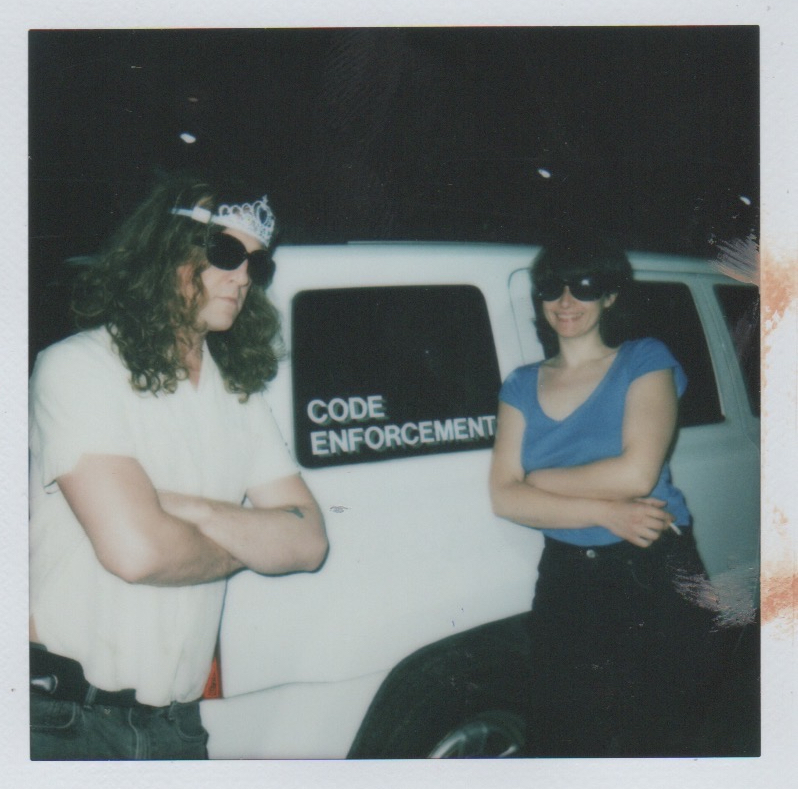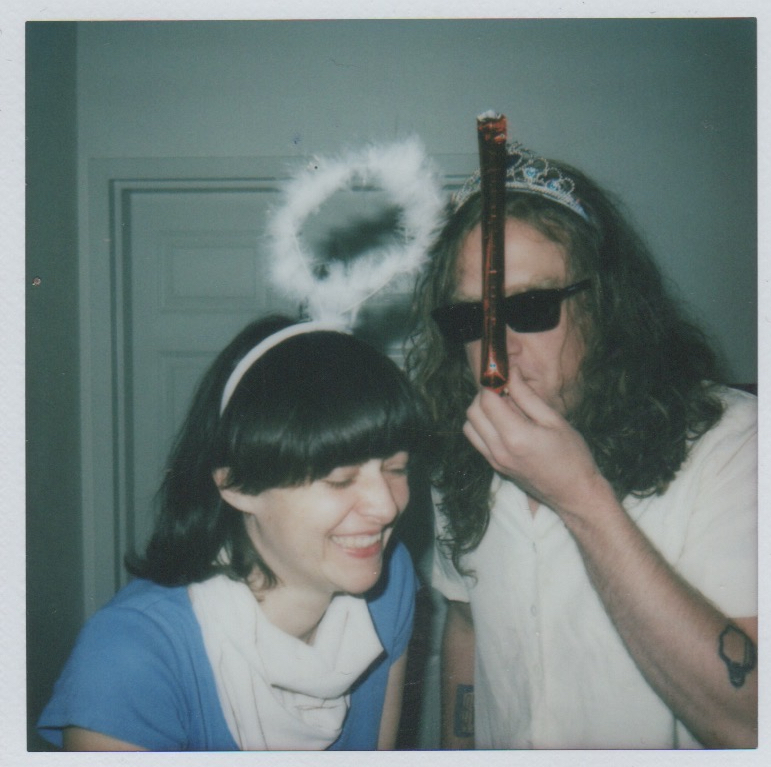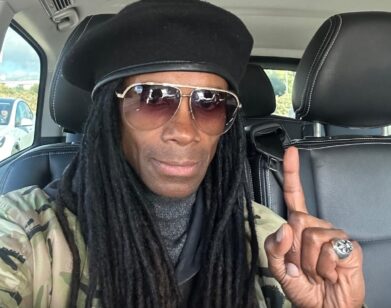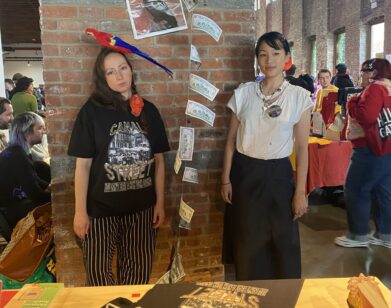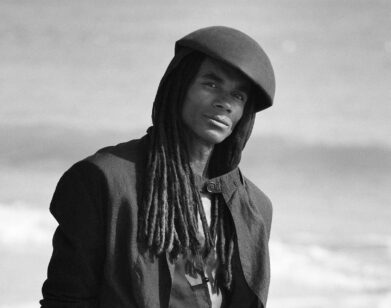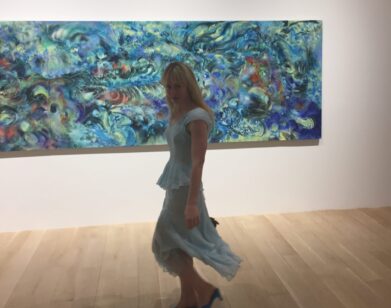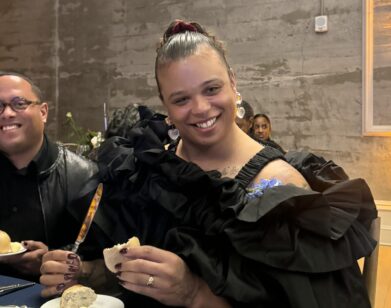DROP
Fievel Is Glauque Wants to Make You Laugh. Then Cry.
As indie-pop songwriter Ethel Cain put it recently, we’re currently living in an irony epidemic. An abundance of ironic remove has led to a paucity of sincerity, a development that keeps us from sharing our real feelings at a frighteningly increasing rate. Then there’s Fievel Is Glauque—a jazz fusion duo consisting of bandleader Zach Phillips and vocalist Ma Clément—who deploy irony and humor as a means of confession.
Phillips, hopping on a Zoom from his home base in New York, maintains the notion that humor can be an effective tool for the disclosure of emotional truths. Between albums like their 2022 debut, Flaming Swords, and their sophomore effort, the brand-new Rong Weicknes, Fievel Is Glauque construct dizzying labyrinths that twist and turn, shifting on an inscrutable dime just when a funky groove starts to settle in. It’s a discombobulating experience designed to elicit both laughs and tears. Rong Weicknes largely concerns itself with the purportedly “wrong” way to do things, such as making a record the “wrong” way. After establishing concrete structures for these songs, Phillips tells me that they would then “fight back” against those structures on repeated recording takes. But the unconventional can often lead to something funny and heartbreaking all at once. To mark the album’s release, Phillips joined me to talk about theology, the art of an effective joke, and curating the talented group of musicians who contributed to the new record. Along the way, he revealed that another one’s already complete.
———
GRANT SHARPLES: First of all, the album is so good. How are you feeling about it? Are you ready for it to be out into the world?
ZACH PHILLIPS: Yes.
SHARPLES: When did you start working on it?
PHILLIPS: I want to say March of last year. We tend to work pretty quickly. We have another record that’s done now, too.
SHARPLES: Oh, wow.
PHILLIPS: I mean, the mixing isn’t done, but the recording is definitely finished. We’ve been doing this for a while now, since 2018. More often than not, when we get a group of people together to play a set of material, we end up with a whole album’s worth of songs and recordings, and very little of that has been released. So I’m very excited for people to hear this record, and for all of our past work to get finished and released. It weighs on my soul that there’s all this work that’s just—
SHARPLES: Hasn’t seen the light of day?
PHILLIPS: Yeah. And it doesn’t ask for much, it just wants to go on and live its quiet life.
SHARPLES: It just wants to be heard.
PHILLIPS: Yeah. I’m not sure that it’s vital that it gets heard, but it does seem to demand something, like a life.
SHARPLES: So I read that you guys put together 35 songs, or at least wrote and recorded 35 songs, for Rong Weicknes. How did you narrow that down to the final track list?
PHILLIPS: Completely intuitively, just thinking about what would work the best with the band that we got together for the record. Of course, you develop ideas about certain songs being hit-like material, and others seem so impoverished and so useless that they also become attractive options to use for a record, because you need some of that too. There’s also questions of balance. But yeah, when we get together, we try to write every day, and writing every day means a finished song every day. So some of these songs are preposterous and insane, and that includes material that’s on the record. And by the way, the album title is pronounced, “Wrong weakness.”
SHARPLES: Where’s that title come from?
PHILLIPS: It’s from St. Paul, or Saul. He has some trip about “when I’m weak, I’m strong.” It’s easy to analogize it to these Christian mystic dichotomies around things like this world and then the sacred, or the beyond. Or more interestingly, like Chronos, chronological time, and Kairos, which is more like experiential time, or the time of eras. So it’s kind of like strength and weakness. The theological message is about how weakness can be a form of strength, and how humbling yourself can be a very, very strong posture. But what if you do it wrong? What if you’re weak in the wrong way? What if you’re not strong when you’re weak because you have the wrong weakness?
SHARPLES: Yeah, it gets a little mind-bendy there.
PHILLIPS: Yeah. We’re mind-benders. We’re abnormal. I mean, everybody’s abnormal.
SHARPLES: How do you think the idea of that “wrong weakness” comes through in the music itself?
PHILLIPS: Well, the production of the record could be said to have been done wrong on every level. It’s a cliche that you make mistakes, and there are happy accidents, and this is part of what makes art so great. Let’s say you play some notes that you did not intend, or that seemed, in retrospect, to be a detour, to put it lightly. Those moments make you feel very present, and you can use that. And I suppose when I was editing the record—which had to be edited in a way that many records don’t have to be edited, because we had a live band tracking the song—we’d get a good take and then we’d be like, “All right, let’s overdub with no click track on top of that take, with the full band playing,” trying to play exactly the same as we had on the previous take, more or less. And then we do that again. And the third time that we do that, we would try to fight the song, fight back against all the structural work we had been doing and really do the songs justice, really play the chart, all of that shit. It’s really cathartic actually.
SHARPLES: Is this the first time you used this recording style, this technique of playing and fighting back and overdubbing?
PHILLIPS: It’s definitely not. It’s not my first time fighting back against the writing, ‘cause that’s been important to me for a long time in different ways. And it was not planned to try this style of recording. Actually, it was that we were getting good takes. We had scheduled, I forget how many days of recording, three or four. And by the second day, we were like, “Yeah, we’re getting good takes. Just keep going. Maybe add songs.” But yeah, it was a total lark.
SHARPLES: So you put together a band of eight musicians for this record, right? I was wondering, how’d you go about deciding who was the right fit for what instrument, what kind of role they would play?
PHILLIPS: Well, Logan Kane is a bassist who I’ve looked up to since I encountered his music maybe seven years ago. Just extraordinary, the platonic ideal of a bassist. I’m just very taken by him. Gaspard Sicx has been with the band for most of our sessions since we started in 2018, so he’s an automatic invitation anytime we’re doing anything. If he can make it, he’s there. Thom Gill, an incredible, unbelievable guitarist. Every time I get to play with him, I feel like I’m playing with a celebrity, in my mind. I’m shocked by how he hears things and what he can do. And he first played in the band the month before the COVID pandemic, so he’s been around. André Sacalxot, we’ve been playing with for two or three years. He was on the tour we did with Stereo Lab in 2022, and he really threw down on this record. He’s extremely gifted, young, able to hear things in the music that I’ve found really surprising and has led things in a different direction than I had ever anticipated them going. And then Chris Wiseman is a deep, old friend of mine who lives in Brattleboro, Vermont. It’s difficult to talk about his music because I have such a close relationship with it and it’s informed me in a lot of direct and indirect ways. But what he brought to the session was a lot of care and a lot of preparation, and then also a kind of a hilarity, a kind of comedic vibe. And then, finally, Daniel Rossi is a friend of ours who we had played with very little, but he’s just an extraordinarily good drummer and we really, really wanted a bunch of percussion on this record. So we asked him to kind of cobble together a percussion kit and play something that was out of the ordinary for him. And I think that when I hear the records, the elements that stand out to me as giving it a lot of depth, but maybe in a way that it doesn’t immediately register, is the percussion and the woodwinds, the horn and the flute, I really used those in the mixing and the editing process.
SHARPLES: I did want to ask you about one song in particular that you guys just put out called “Love Weapon.” You originally wrote it in 2011 with Blanche Blanche Blanche. Why did you decide to revive it for Fievel?
PHILLIPS: It’s been a tradition since the first Fievel session that we add a Blanch song, so we’ve done quite a few of them. Ma and I chose Love Weapon for a tour we did in Europe in 2019. And we actually did a great recording session, but we didn’t really feel like we hit that one how we wanted to. I don’t know how other people experience it, but if somebody asked me to show them three or four songs I’ve written to give them an idea of my music, that would be one of them. You know how musicians talk about wanting to be heard and stuff like that? I don’t really feel that way mostly, but I do about “Love Weapon.”
SHARPLES: What is it that you love so much about it?
PHILLIPS: Its simplicity. The way it works remains confusing to me. Its simplicity launders some kind of complexity that has to do with harmonic rhythm or something. I don’t know, it just flows really well. It doesn’t seem like I had anything to do with it, but that’s what I like about it. I’m able to appreciate it as a not-me object.
SHARPLES: Are there any other songs on this record that you feel similarly about?
PHILLIPS: Yeah. I actually really love these songs. It’s kind of normal to release a record and there’s some clinkers on there. That’s more than acceptable, for some of a record to suck, and it almost should. But this record is dangerously good. It’s actually kind of shocking. There’s not really a clinker in the bunch for me. I mean, there’s a couple that are pushing it. But I feel really, really, really good about “It’s So Easy” and “Rong Weicknes.” Those songs that Ma [Clément] and I wrote together, I’m just very taken by. I remember “Hover” and “Eternal Irises” made us cry, but that’s not mutually exclusive with laughing. I mean, that’s a huge part of it, trying to get somewhere where you’re always about to laugh at the other person’s funny new idea. That’s kind of a blessed state to be in, writing-wise. You’re like, “But wouldn’t it be so funny if we said this?” And it’s like, “Oh, that’s so funny,” but then it’s something tragic and deeply disturbing.
SHARPLES: It’s like one almost kind of accentuates the other.
PHILLIPS: Yeah, yeah.
SHARPLES: Yeah. I also wanted to ask you about “As Above So Below,” because I saw that it was inspired by an occultist text from the ninth century. Can you tell me a bit about that?
PHILLIPS: That sounds really fancy, right? I’m not going to deny that I have some highfalutin tendencies. I like to read and I am interested in different kinds of religious mysticism and psychoanalysis and blah, blah, blah, these kinds of phenomenology of experience. But honestly, what that’s a reference to for me is the movie Dogma by Kevin Smith, with Matt Damon, Ben Affleck, Chris Rock, Salma Hayek, Alanis Morissette. Have you seen Dogma? It’s really good.
SHARPLES: No, I haven’t.
PHILLIPS: It was reportedly Prince’s favorite movie. And there’s a whole thing on YouTube of Kevin Smith telling a crazy story about going to Paisley Park because Prince reached out to him because of Dogma and really wanted him to direct prayer meetings or something.
SHARPLES: Lyrically, do you guys feel like you get a lot of jokes in the music?
PHILLIPS: Hell yeah. If we didn’t, I wouldn’t like this, because the world has too much self-serious expression. Having levity be part of your orientation in making things leads to things that contain more. That’s what I’ve noticed, anyway. You need to play with language and let language play with you. And one way to gain access to that kind of state of mind is by willing yourself into a kind of psychedelia through humor. Everything is pretty strange, and we’re not even talking about all the problems that perplex us and make us miserable sometimes. It seems like there’s always this fork in the road all the time, where if you take the path that involves levity, humor is where you get the whole picture. Seriousness blocks humor, but humor doesn’t block seriousness.
SHARPLES: I’ll leave you with one more question: if there’s something that Fievel fans or just general listeners could take away from Rong Weicknes, what would you hope that to be?
PHILLIPS: I hope that they hear that we tried to do something we weren’t trying to do. Listening to our music hopefully means that we’re going to surprise ourselves and we’re going to try to surprise you. We’re simple people who did not come into this band with a bunch of ambition about reaching a third of as many people as we’ve reached already. I hope people know that we are confused, and that we don’t know what this is, that we do it because we love writing and we love playing with these amazing people. It’s something that’s made together, in real air. Everybody who plays in the band writes their own music on top, and the whole thing is designed to be open to the people who participate in it, to figure out how they want to relate to it and what they want to bring to it instead of some kind of prefab confection where everything is planned. So we don’t know what we’re doing until we do, but then we know rather well what we’re doing.
SHARPLES: Well, thank you so much, Zach. Congrats on the record.
PHILLIPS: Thanks for interviewing us.

